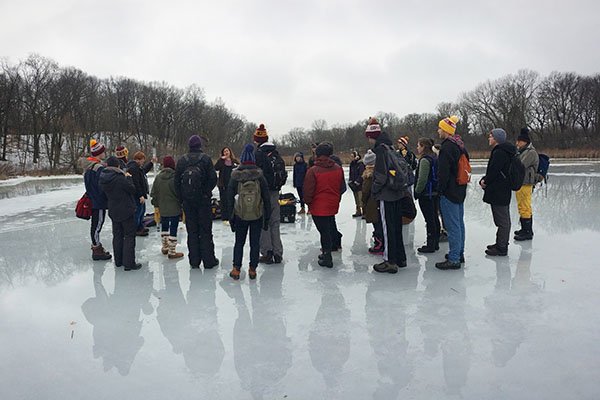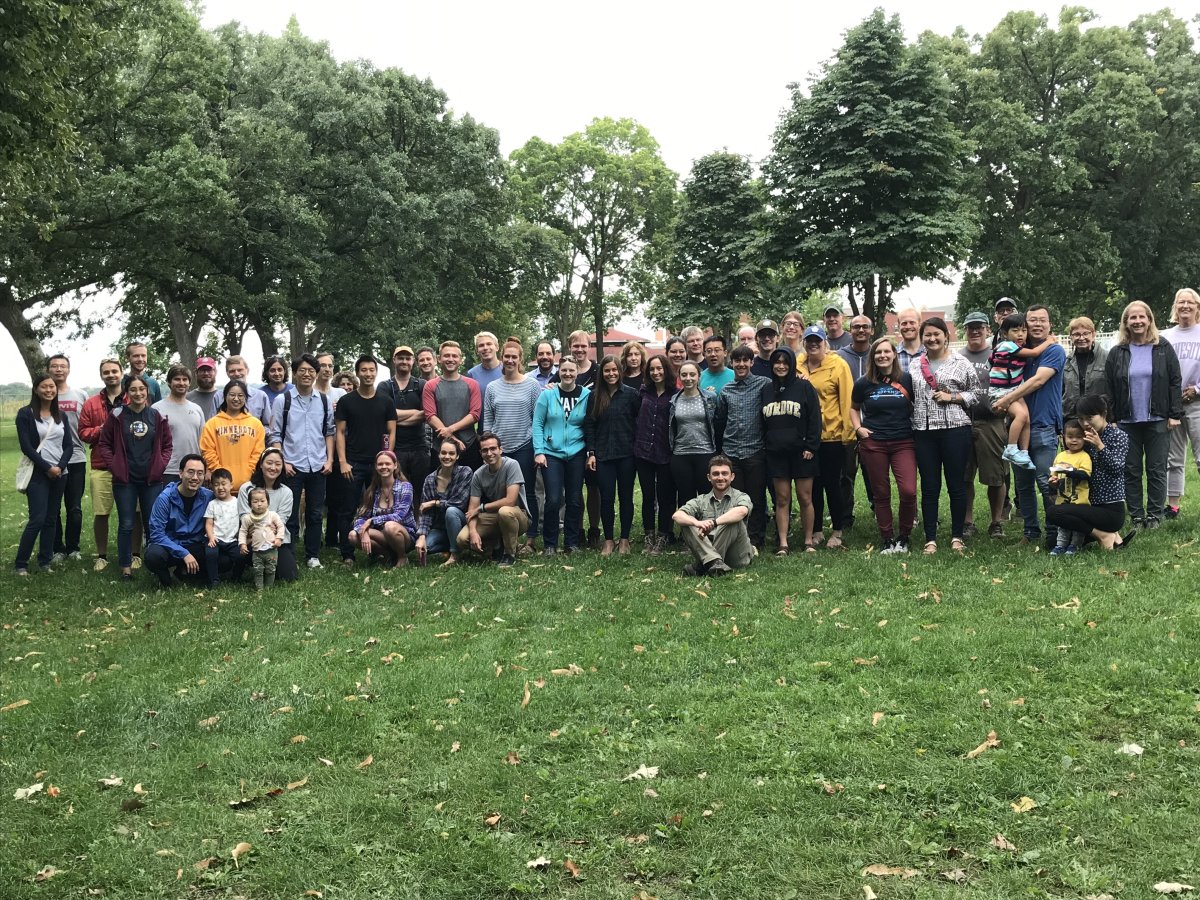Undergraduate Programs
Earth and Environmental Scientists study the behavior and evolution of our planet, from the dawn of the solar system and the formation of the continents to the modern environments that sustain human civilization.
If you've asked yourself these questions, then our programs are for you!
- Is my water safe to drink?
- What is this rock?
- Is there life on other planets?
- Interested in core sciences (chemistry, physics, math)? Check these options.
- What can I do and how much can I make after I graduate with one of these degrees?
We will help you find the answers!
Academics
The Department of Earth Sciences has defined the following learning outcomes as motivated by the University Student Learning Outcomes:
Students can identify, define, and solve a range of fundamental problems in Earth Sciences.
Students demonstrate the ability to locate and collect data relevant to problems in Earth Sciences and to analyze those data in an appropriate manner.
Students will demonstrate the ability to apply knowledge of Earth Sciences, including the processes of the integrated Earth system and the history of the Earth system, at an appropriate level of sophistication and rigor.
Students can communicate scientific information and ideas effectively to various audiences in appropriate modes (writing, verbally, visually).
Our programs emphasize applications of physics, chemistry, biology, mathematics, and data science to understanding Earth and humans’ role within it. We offer four major programs, and two minor programs:
- BS and BA in Earth Sciences
- BS and BA in Environmental Geosciences
- Minor in Geology
- Minor in Environmental Geosciences
Studying the Earth is a quite a broad concept, as a result, there are many subdisciplines within the Earth and environmental sciences. To learn more about these subdisciplines, please visit What is Earth Science? and/or our Discover Our Research page.
Honors Programs
Frequently Asked Questions
+
What is the different between the Earth Sciences and Environmental Geoscience majors?
Earth Sciences covers the broad composition and structure of Earth, from the core and deep interior to the oceans and climate system. Earth Scientists study how physical, chemical, and biological processes created and shaped the planet over billions of years, and how Earth continues to evolve today. This includes plate tectonics, earthquakes, volcanoes, water, ice ages, the uplift and erosion of mountains, gravity and magnetic fields of the Earth, paleontology, and even the evolution of other planetary bodies in our solar system. Deep time is an essential concept in Earth Sciences.
Environmental Geosciences focuses on the critical zone at Earth’s surface where people interact with our planet, including soils, groundwater, rivers, glaciers, mineral and energy resources, and natural hazards. The Environmental Geosciences program enables students to understand the natural systems at work on Earth’s surface so that we may better forecast the environmental consequences of our collective actions and build more sustainable communities.
+
What is the difference between a BA and BS degree in these majors?
A BA degree allows a student to develop a fundamentally broader perspective on the world, whereas a BS degree allows a student to specialize more deeply in a particular discipline. Students pursuing a BA degree are required to meet a foreign language requirement and take a greater number of courses from outside our department. Students earning BS degrees do not have either of these requirements, but are required to take more advanced math courses and a greater number of elective courses within our department. Otherwise, BS and BA students share the same classes and assignments.
There are very few real job implications for a BA or BS degree. Both degrees are equally competitive if a student decides to apply to graduate school for a Masters or PhD at a later date. Similarly, the vast majority of employers do not differentiate between applicants who have a BA or a BS. Instead, they are more concerned with the specific coursework that a student completed during their university career. Two exceptions include the petroleum geophysics and mineral exploration geophysics communities, which tend to prefer BS degrees.
All ESCI BS degree programs are managed through the College of Science & Engineering, while all ESCI BA programs are managed through the College of Liberal Arts. Students deciding between these programs should weigh whether they are interested in pursuing a degree with more breadth in the liberal arts or more specialization in the sciences during their time as an undergraduate.
+
How does environmental geosciences compare to other environmental programs at the U?
In general, scientists strive to understand how natural systems work, while engineers build systems that fulfill a societal need. The Environmental Engineering and Geoengineering programs in the Department of Civil, Environmental, and Geo-engineering are concerned with building structures and infrastructure related to municipal wastewater treatment, drinking water systems, and sustainable natural resource extraction that meets state and federal regulations. These engineering disciplines require knowledge of natural systems, but only to the extent that they inform the engineering process. Some Earth & Environmental Sciences (ESCI) courses are required for these majors to fulfill these needs.
The Biology, Society, and & Environment (BSE) BA degree offered by the Department of Geography, Environment, and Society in the College of Liberal Arts involves comprehensive training in biology along with an examination of its role in social, environmental, and health-related problems. No ESCI courses are required in this program.
The Environmental Sciences BS degree within the Environmental Sciences, Policy and Management (ESPM) program is one of four ESPM tracks offered through the College of Food, Agricultural and Natural Resource Sciences (CFANS). This degree shares some of the same ethos with our Environmental Geosciences degree, but has some important differences. The ESPM program includes coursework on ecology and environmental policy that is not required in the Environmental Geosciences degree and requires no courses in ESCI whatsoever. The ESCI Environmental Geosciences program focuses more on the geological processes that influence our environment and climate, including a more robust focus on groundwater processes, water chemistry, rivers and streams, and the important ways in which microbes interact with water, minerals, and contaminants.
The Bioproducts and Biosystems Engineering (BBE) department offers two degrees: The Bioproducts and Biosystems Engineering major, which explores developing sustainable products and manufacturing processes to meet society’s growing needs for material, chemical, food, and energy demands. The Sustainable Systems Management major aims to promote sustainability by optimizing processes and products, commercial and industrial businesses, buildings and energy systems. No ESCI courses are required for either BBE major.
The Institute on the Environment offers the Sustainability Studies Minor. In this program, students combine knowledge from across the natural, social, and applied sciences to explore real-world environmental problems from multiple perspectives. This minor may be completed concurrently with any ESCI degree program, and some ESCI courses can be used as electives for completion of the Minor.
+
Do you offer Geo-engineering?
The Department of Earth & Environmental Sciences is proud to offer a dual-degree program between our Earth Sciences BS and the Geo-engineering BS program in the Department of Civil, Environmental, and Geo-engineering. This program allows students to complete both majors within four years by taking advantage of overlapping coursework in both departments. Interested students should contact the Directors of Undergraduate Studies in both departments to pursue this option.
Sample 4-year plan for this dual-degree program can be found here.

Outside the Classroom
Education outside the classroom provides valuable hands-on experiences that allow students to put what they learn into context and toward real-world issues.
- Field experiences, whether as part of coursework, research, or trips for fun, give students the opportunity to see first-hand what they learn in the classroom.
- Research opportunities can include study in the field, laboratory, or computer programming.
- Internship programs in academia and in industry.
Please explore "Outside the Classroom" experiences.
Community
Our department has a vibrant social network. The undergraduate GeoClub (officially University of Minnesota Geological Society) is very involved in outreach, departmental committees, social activities, and fund raising for field trips and scholarship.
The department itself holds many social functions that allow for interaction with everyone in the department, from interns to emeritus professors. These activities are both academic (weekly seminars) and for fun (departmental picnics). All are welcome!
